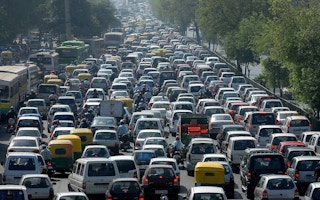China, the biggest emitter of greenhouse gases, plans to widen the number of cities curbing auto purchases to fight pollution and congestion, threatening vehicle sales, the government-backed car association said.
Eight cities — Chengdu, Chongqing, Hangzhou, Qingdao, Shenzhen, Shijiazhuang, Tianjin and Wuhan — will probably introduce measures limiting auto purchases, Shi Jianhua, deputy secretary general of the China Association of Automobile Manufacturers, said in a briefing in Beijing today, without being more specific about the timing.
Such limitations could cut vehicle deliveries by 400,000 units, or 2 percent of nationwide sales, and undermine economic growth, Shi said. If introduced, the measures may triple the number of Chinese cities — Beijing and Shanghai have vehicle quotas — imposing curbs on automobiles as public anger grows over worsening congestion and air pollution.
“In the short term, the market will just jump in those cities,” saidYale Zhang, managing director of Autoforesight Shanghai Co. “Consumers will panic and will start to buy whatever they can before the measures.”
Local brands would suffer the most as restrictions would make car ownership more inconvenient and undermine the appeal of cheaper vehicles, he said.
More restrictions
Shijiazhuang, one of China’s most polluted cities, proposed limiting vehicle ownership through a lottery, according to a Shijiazhuang Daily report on the local government’s website last month. The Zhejiang eastern province held discussions last month to limit the number of new vehicles in the provincial capital of Hangzhou and Xi’an, home of China’s terracotta warriors, discussed limiting vehicle ownership last year.
CAAM is opposed to the restrictions because they go against efforts to boost consumption, deprives people of the equal right to own a car and don’t do much to ease traffic jams, Shi said. The association has submitted a study on the impact of purchase limits to the Ministry of Industry and Information Technology, which oversees the auto industry, he said.
The auto group said in February that the industry has become a “scapegoat” for the toxic smog that engulfed Beijing last winter when coal-fired power plants should bear the main responsibility for the pollution.
Passenger-vehicle sales rose 9.3 percent to 1.4 million units in June, the association said today, after dealers increased discounts to clear stock and meet half-year targets amid a cash crunch and concerns the economy is slowing. For the first half, passenger-vehicle deliveries increased 14 percent, while total vehicle demand, including buses and trucks, gained 12 percent, according to CAAM.
Cash crunch
Expanding restrictions on vehicle purchases would follow a cash crunch that sent interbank borrowing costs to record levels last month and a slowing economy.
Official trade data today showed China’s exports and imports unexpectedly declined last month, underscoring the severity of the slowdown in the world’s second-biggest economy as Premier Li Keqiang reins in credit growth.
The cash squeeze has led to “psychological panic among dealers over access to financing,” Luo Lei, deputy secretary-general of the China Automobile Dealers Association, said in a phone interview from Beijing yesterday. “So far, it hasn’t caused any real damage to the industry, but if the cash crunch continues, the impact will spread to auto dealers.”
Banks are taking twice as long approving car loans after the cash crunch, which will hit mid-priced car sales the hardest, the Securities Daily reported today, citing interviews with auto dealers.
“More cities will introduce purchase restrictions,” said Ole Hui, a Hong Kong-based analyst with Mizuho Financial Group Inc. (8411) “This is just the beginning of a long-term trend.”








